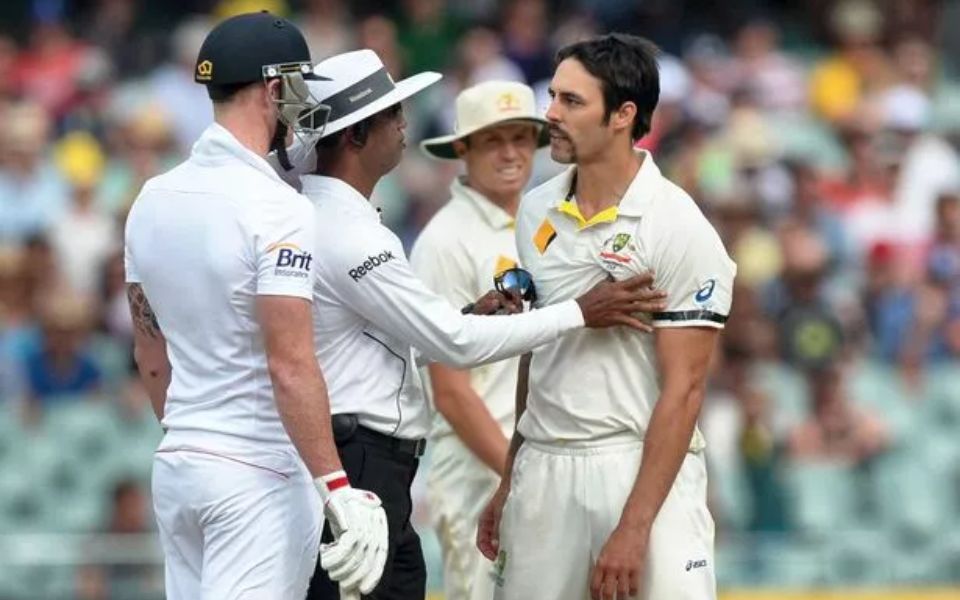7 most controversial moments in Ashes history
Let us take a look at five most controversial moments in Ashes history.
3 Min Read


England and Australia are set to renew their iconic rivalry in the upcoming Ashes series, beginning with the first Test in Perth on November 21. While Australia enter as favourites, their injury concerns give England renewed belief heading into the contest. Across decades of competition, the Ashes has delivered not only unforgettable cricketing brilliance but also several explosive controversies. Here, we look at five of the most controversial moments in Ashes history.
Here are five most controversial incidents from the Ashes
Dennis Lillee’s aluminium bat incident
During the 1979–80 Test at Perth, Australian legend Dennis Lillee walked out to bat wielding an aluminium bat made by a company owned by his friend. With no rules at the time prohibiting metal bats, Lillee used it freely until England captain Mike Brearley protested, arguing the bat was damaging the ball. After discussions, umpires asked Lillee to switch bats. Lillee furiously resisted until captain Greg Chappell intervened, convincing him to change. Lillee then threw the aluminium bat away in anger—creating one of cricket’s most bizarre controversies.
Jonny Bairstow’s stumping at Lord’s
In one of modern cricket’s most heated Ashes flashpoints, Jonny Bairstow was controversially stumped by Alex Carey after wandering out of his crease at the end of an over. Carey collected the ball from a bouncer and immediately threw it at the stumps, with Bairstow assuming the ball was dead. The third umpire confirmed the dismissal was legal. The incident ignited furious debates about the “spirit of cricket” and triggered a chorus of boos at Lord’s, leading to tense scenes both on and off the field.
Michael Clarke’s threat to James Anderson
Michael Clarke’s infamous stump-mic warning, “Get ready for a broken f**ing arm”*, directed at James Anderson during the opening Test at Brisbane remains one of the most shocking on-field exchanges in Ashes history. The remark, made during a tense final spell, dominated headlines worldwide. The moment reignited debates about sledging limits and set the tone for one of the most fiery and hostile Ashes series ever played.
Tim Paine’s texting scandal
Just 19 days before the 2021–22 Ashes, Australian cricket was shaken when captain Tim Paine stepped down after explicit text messages he sent to a female colleague in 2017 resurfaced. Though previously investigated, the controversy re-emerged publicly, prompting Paine’s resignation. The scandal overshadowed the lead-up to the series and raised questions about leadership accountability and Cricket Australia's handling of the incident.
Stuart Broad’s ‘Not Walking’ incident
In the 2013 Ashes epic at Trent Bridge, Stuart Broad edged Ashton Agar to Michael Clarke at slip via Brad Haddin’s gloves. The deflection was clear, yet umpire Aleem Dar gave Broad not out. Broad, knowing he had edged it, chose not to walk and remained at the crease. He went on to score a crucial 65, and England won the match by just 14 runs. The incident sparked widespread debate about sportsmanship and the decision review system, becoming one of the series’ defining controversies.
Moeen Ali alleges racism
Moeen Ali, who returned from Test retirement for the Ashes, made a shocking revelation about a racist comment directed at him during the 2015 series. The England all-rounder alleged that an Australian player referred to him as ‘Osama’ during the first Test in Cardiff. Moeen had starred in that match, scoring 77 in the first innings and taking five wickets in England’s 169-run victory. He revealed that he raised the issue later in the series, but the player in question denied the slur, claiming that some of his best friends were Islamic.
The Bodyline shocker
The Bodyline series remains the most infamous controversy in Ashes history. Devised by England captain Douglas Jardine during the 1932–33 tour of Australia, the tactic aimed to neutralize Sir Don Bradman’s extraordinary run-scoring. England’s fast bowlers delivered short-pitched balls directed at the batters’ bodies, hoping to force defensive shots that could be caught by a packed leg-side field close to the bat. While technically legal at the time, the strategy was considered dangerous and unsporting.
Why was the 'bodyline' bowling technique invented?
Download Our App